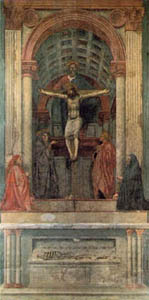You know, it is the Year of the EUCHARIST, not the Year of Us!
Well, it's good that they are trying to answer the call of JP II to honor the Year of the Eucharist, but Sr. Rehrauer may need to brush up on her Vatican II documents a bit further, instead of only reading the parts that "America" magazine selectively picks out for the "Spirit of Vatican II" crowd.
Speaker: Eucharist is part of daily life
Opening with Luke 4:16-22, Rehrauer said the Gospel writer of Luke tells of Jesus’ visit to the synagogue, the reading of Isaiah, and Jesus’ comment “This day, this Scripture passage is fulfilled in your hearing.”
“Luke is silent about the content of Jesus’ homily, except for the line on ‘this day.’ The homily unfolds over the next 20 chapters in the words and deeds of Jesus. It outlines the mission of the church and the mission for all of us. It proclaims liberty, freeing the oppressed and preaching the Gospel in word and deed. It talks about building the kingdom by doing justice.
“This is climaxed in the Eucharist,” she said. “It is what sustains us when the vision of Eucharist fades.”
"The vision of the Eucharist fades"? Since the Eucharist is Jesus Himself (a part you seem to have missed along the way), and our eternity is meant to be spent before the face of Jesus, the only way I know of that the "vision" of the Eucharist fades is if you find yourself in the hot hole after you die -- and even then, Aquinas doubts that it fades, but rather that you will experience it just as utterly as if you were saved, only for the damned they suffer more greatly because of their eternal "vision of the Eucharist."
But whatever.
Next,
She divided the Mass into four segments:
• Entrance rites, where people are called as an assembly.
• Liturgy of the word, where people listen to the word of God.
• Liturgy of the Eucharist, which is a surrendering of their lives and themselves as they join in a meal with Christ.
• Dismal rites, which tell people to go out and live the mission in prayer and action together.
The "Dismal" rites -- well, I can see why, rites without true meaning are indeed dismal. And hey, if all we're doing is "sharing" a meal with Christ at Mass, then no wonder people are so distraught by not being able to sit at the table themselves -- to share a family dinner when you are spread out among the pews (padded chairs at your church Sister?) is not exactly the same as either the formal dining experience or the family gathering. If you remove the sacrifice, you've lost the primary purpose. But then again, you say that your whole mission is not to save souls but rather to...
“Our mission,” Rehrauer said, “is to become community. Sometimes we divorce prayer and our living, but by coming together for Eucharist, we develop and deepen our relationships and love.”
Translation: "I don't care if you make it to heaven, so long as "I love you, you love me, we're a happy family!""
“When we come to celebrate, we come from different backgrounds, different families and from different faith places,” she said, adding that individuals also never come from the same “faith place” twice. When they come to worship, they may at one time be feeling lonely, fearful, sad or angry. At another time, they may be happy.
Different "faith places"? What the heck is that? "Yes, today, I came from the faith place of I-want-to-kiss-a-tree, tomorrow I might come from Mother-God-loves-witches faith place, and perhaps on Tuesday I will come from Promote-government-programs-so-I-don't-have-to-feel-guilty-about-staying-home-to-watch-Friends faith place.
Hmm.
“As Robert Frost said, home and Eucharist is where they have to take you in,” Rehrauer said. “It doesn’t matter where we come from. It matters that we come. The liturgy has the power to overcome our differences.”
Hmm. Pope Robert Frost. Sounds good to me.
Oh, and Liturgy -- get down! I know you want to bear hug everyone, but you just don't know how much power you have!!
Funny how whenever the Person of the Eucharist is reduced, the Liturgy is personified instead.










0 Comments:
Post a Comment
<< Home